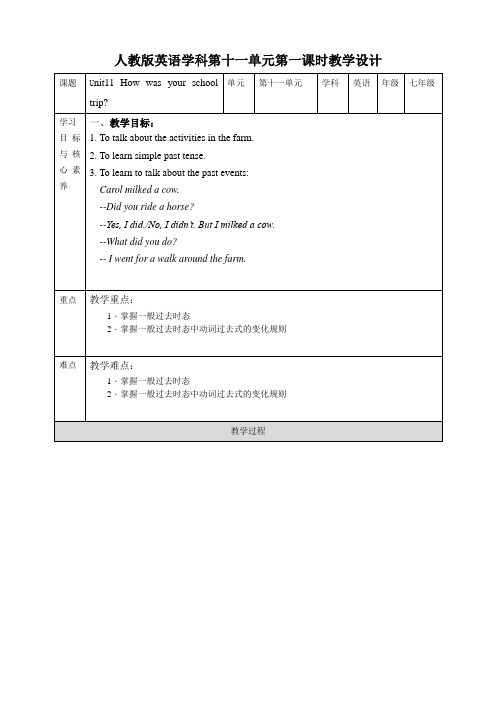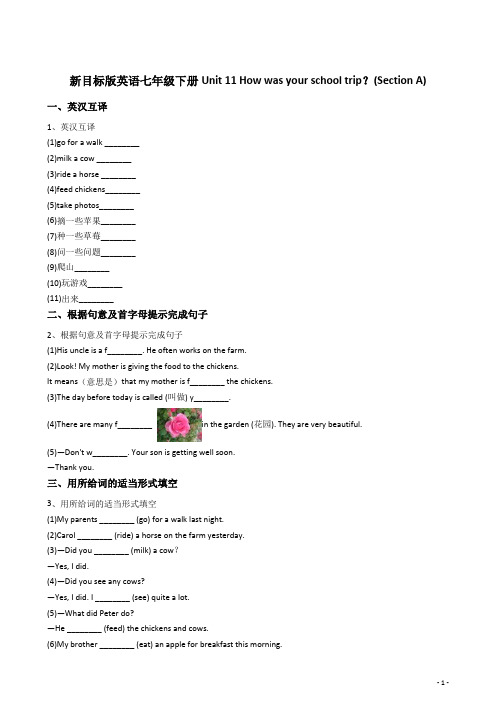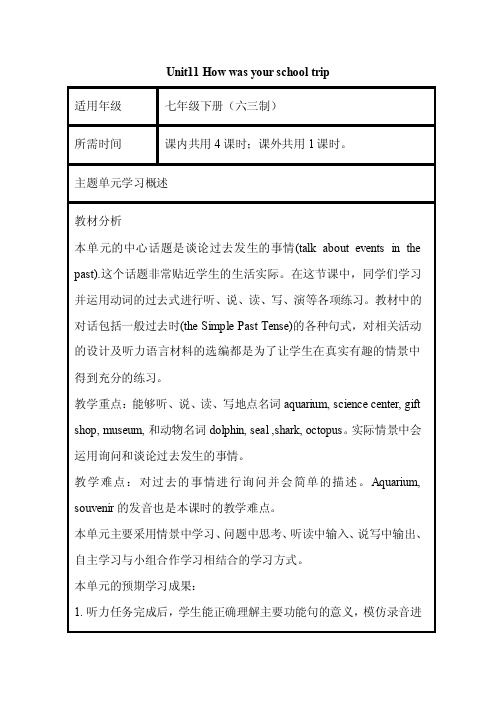七年级英语下册Unit11Howwasyourschooltrip时尚阅读素材新版人教新目标版
初中英语 七年级下册 Unit11How was your school trip

the trip the train
the museum
the gift shop and gifts
Helen
exciting fast
really interesting
lovely, not expensive
Jim terrible slow
big, boring, dark, too many people
2. Learn about Helen’s and Jim’s diary entries. 3. Learn to write diaries with past tense.
Lead-in
Look at the pictures and talk —I +v-ed(went to …)/ —It/That sounds…
The museum was big and boring. Everything was
about robots and I’m not interested in that.
be interested in… 对……感兴趣
hear v. 听到;听见。 用法:hear sb. do sth. 听到某人做 某事(全过程)hear sb. doing sth. 听到某人正在做某事
✓ 特殊疑问词+不定式结构可改写成由该疑问词 引导的宾语从句,改写时在疑问词后加主语 (与主句主语一致),将不定式改成“should+ 动词原形”作谓语。
You have to consider what to do next. =You have to consider what you should do next.
总的来说,相当于in a word或in short.
初中英语七年级下册 Unit11How was your school trip

人教版英语学科第十一单元第一课时教学设计课题U nit11 How was your schooltrip?单元第十一单元学科英语年级七年级学习目标与核心素养一、教学目标:1. To talk about the activities in the farm.2. To learn simple past tense.3. To learn to talk about the past events: Carol milked a cow.--Did you ride a horse?--Yes, I did./No, I didn’t. But I milked a cow. --What did you do?-- I went for a walk around the farm.重点教学重点:1.掌握一般过去时态2.掌握一般过去时态中动词过去式的变化规则难点教学难点:1.掌握一般过去时态2.掌握一般过去时态中动词过去式的变化规则教学过程课堂小结Summary1.重点单词:milk,cow,horse,feed,farmer,quite2.重点短语:go for a walk, milk a cow, ride a horse, feed chickens, talk witha farmer, take some photos, quite a lot3.重点句式:—Did you see any cows?—Yes, I did. I saw quite a lot.—Did you ride a horse?—No, I didn't. But I milked a cow.板书go for a walk, milk a cow, ride a horse, feed chickens, talk with a farmer, take some photos, quite a lot。
新目标版英语七年级下册Unit11Howwasyourschooltrip?(SectionA)含答案

新目标版英语七年级下册Unit 11 How was your school trip?(Section A)一、英汉互译1、英汉互译(1)go for a walk ________(2)milk a cow ________(3)ride a horse ________(4)feed chickens________(5)take photos________(6)摘一些苹果________(7)种一些草莓________(8)问一些问题________(9)爬山________(10)玩游戏________(11)出来________二、根据句意及首字母提示完成句子2、根据句意及首字母提示完成句子(1)His uncle is a f________. He often works on the farm.(2)Look! My mother is giving the food to the chickens.It means(意思是)that my mother is f________ the chickens.(3)The day before today is called (叫做) y________.(4)There are many f________ in the garden (花园). They are very beautiful.(5)—Don't w________. Your son is getting well soon.—Thank you.三、用所给词的适当形式填空3、用所给词的适当形式填空(1)My parents ________ (go) for a walk last night.(2)Carol ________ (ride) a horse on the farm yesterday.(3)—Did you ________ (milk) a cow?—Yes, I did.(4)—Did you see any cows?—Yes, I did. I ________ (see) quite a lot.(5)—What did Peter do?—He ________ (feed) the chickens and cows.(6)My brother ________ (eat) an apple for breakfast this morning.(7)John ________ (study) English last Friday.(8)There ________ (be) two books on the table five minutes ago (以前).(9)They ________ (play) basketball yesterday afternoon.(10)The man ________ (stop) his car and ________ (buy) some strawberries yesterday morning.四、单选题4、It ___________ sunny yesterday. It ___________ rainy today.A、is; isB、is, wasC、was, isD、was; was5、—Jack, is there ___________ in today's newspaper?—No, nothing.A、anything importantB、something importantC、important anythingD、important something6、Yesterday my father ___________ his friends ___________ Tian'anmen Square (天安门广场).A、shows; aboutB、shows, aroundC、showed; aboutD、showed; around7、Could you say it again? I can't understand ___________ you are talking about.A、howB、whenC、whatD、which8、—___________ he go to Central Park?—Yes, he did.A、DidB、DoC、DoesD、Is9、It ___________ last week that the haze(雾霾) in Beijing caused many problems.A、reportsB、reportedC、is reportedD、was reported10、—Did Jim and Sue go to the party?—No, they ___________.A、didB、didn'tC、wereD、weren't11、—Do you need a new dictionary, Susan?—No, Mum. My uncle ___________ me one yesterday.A、buyB、buysC、boughtD、is buying12、—Who is it?—Me. I ___________ this photo when I was four.A、tookB、takesC、takeD、am taking13、Last Sunday, Carol and his friends ___________ some apples and ___________ them home.A、pick; tookB、picked; tookC、picked; takeD、pick, take五、根据汉语提示完成句子14、根据汉语提示完成句子(1)Don't ________(担心). The ________(太阳)is coming out.(2)My classmate helped ________(农民)________(种植)rice and ________(采;摘)apples last Sunday.(3)There are ________ ________ ________ ________ ________(相当多的马)on the farm.(4)—Did you learn ________ ________(优秀的东西)in the ________(农村)?—Yes, I did.(5)She was very ill, but ________(幸运地)she is now out of danger.六、按要求改写句子15、按要求改写句子(1)My school trip was pretty great last weekend.(对画线部分提问)________ was ________ school trip last weekend?(2)The twins played computer games yesterday.(改为一般疑问句,并作否定回答)—________ the twins ________ computer games yesterday?—No, ________ ________.(3)I saw cows last week. (改为一般疑问句,并作肯定回答)—________ you ________ cows last week?—Yes, ________ ________.(4)There were some chickens on the farm.(改为一般疑问句,并作肯定回答)—________ ________ ________ chickens on the farm?—Yes, ________ ________.(5)My family went fishing last Sunday.(对画线部分提问)________ ________ ________ family ________ last Sunday?七、补全对话16、补全对话Jim: Hey, Sally! I didn't see you last Saturday. Where were you?Sally:(1)________Jim: Why?Sally:(2)________Jim: Like what?Sally: Well, I cleaned my room. And I did my homework.Jim:(3)________Sally: Yes. How about you? What did you do?Jim:(4)________Sally: Wow! You had fun.Jim:(5)________八、阅读理解17、阅读理解We went on a school trip to New York. We had a good time. There were twenty-four students and three teachers. It was a five-day trip, and we visited some attractions (景点).We stayed at a hotel and six people had one room. We often had our meals out of the hotel—there were a number of restaurants nearby. We went around the city, and we were really given quite a lot of freedom(自由). So long as (只要) we were back to our rooms by 10 p.m., we could go where we wanted to. I was surprised at how safe I felt walking around New York in small groups. My friends and I enjoyed ourselves on the trip. I would like to advise it to anyone. If you decide to go, you will have a great time!(1)What is the message mainly about?A、A picnicB、A school trip.C、Ice-skatingD、Shopping.(2)How many people went on the trip?A、SixB、TenC、Twenty-fourD、Twenty-seven.(3)According to the passage, which of the following is NOT true?A、Six students lived in one room in the hotel.B、Students had to get back to the hotel by 10 pm.C、Students spent five days on the trip.D、Students had their meals in the hotel.(4)What did the author think of the trip?A、He had a good time.B、He wanted more freedom on the trip.C、He didn't want to come back.D、He was surprised at how dangerous New York was.(5)What does the underlined word "advise" mean in Chinese?A、说B、推荐C、建议D、喜欢答案解析部分一、英汉互译1、【答案】(1)去散步(2)给奶牛挤奶(3)骑马(4)喂鸡(5)照相(6)pick some apples(7)grow some strawberries(8)ask some questions(9)climb the mountains(10)play games(11)come out【解析】【分析】考查短语的英汉互译,注意名词要用复数形式。
初中英语 七年级下册 Unit11 How was your school trip

练习:判断下列句子是否用一般过去时。 I got up at six thirty yesterday morning. He had a good time last summer? He was there five minutes ago. The little girl was born in 2008. When Tony was young, his parents passed away. I saw him at the gate of the school just now.
reply on the right.
Dear Bill, How _w_a_s_ (is) your school trip yesterday? _D_i_d_ (Do) you _g_o_ (go) to the zoo? _D__id__ (do) you take any photos? _D_i_d_ (Do) you _s_e_e_ (see) any interesting animals? I _w_e_n_t_ (go) to the zoo last year and it _w_a_s_ (is) a lot of fun. Jim
类别 中间去e,词尾加t
词尾的d变成t 过去式以ought/ aught结尾 be动词的过去式
例词 keep→kept feel→felt sleep→slept spend→spent send→sent lend→lent think→thought teach→taught buy→bought
We _a_t_e_ (eat) our lunch under some trees and _p_la_y_e_d_ (play) some games after that. But at about two o’clock, it _g_o_t (get) very cloudy and we _w_o_r_r_ie_d_ (worry) it would rain. Luckily, it _d_id_n__’t_ (do not), and the sun _c_a_m__e_ (come) out again!
人教版七年级下册 Unit 11 How was your school trip 知识点(适合于听写 学生对照背诵)-带答案

人教版七年级下册Unit 11 How was your school trip 知识点1.把...喂给...用...喂养...以...为食...2.一个能干的农夫正在他的大农场耕作。
3.在农场周围散步4.许多/ 许许多多的5.我有很多事情要告诉你。
6.相当漂亮的一个女孩(quite / very )7.你知道关于他的一些事吗?8.带领某人参观某地9.show up / show off / on show10.看见一些有趣的事情11.从某人哪里学到很多关于12.名词前有哪些词时,无介词13.一名优秀的运动员在...方面优秀14.幸运的是,我们及时上了汽车。
15.一般过去时的标志词16.蛮好玩17.你说的太多了18.so many 和so much的区别19.很开心做某事20.担忧某事(worry)2种e out 的含义3种22.天气变得非常的晴朗。
23.长得很好/ 长大/种植水稻24.绘画/ 油画25.去旅行(2种)26.到...去旅行/ 去度假27.沿途/ 顺便问一下/ 以这种方式28.教我们如何制作机器人教某人如何做某事29.教某人某事30.我不知道去哪里/做什么/怎么做31.北京房子的价格很高。
32.总的来说33.让人兴奋的一天34.今天的学校旅行/五分钟的路程35.复合不定代词36.对...感兴趣/37.听到某人做某事/听到某人正在做某事38.不客气(all)39.作文构思40.你的学校旅行怎么样?41.去散步42.给奶牛挤奶43.骑马44.喂鸡45.与农民交谈46.拍一些照片47.带领Alice参观农场48.学习了很多关于农务49.从十二月到六月种植草莓50.摘一些草莓51.带他们回家52.你上周旅行怎么样?54.我去农村拜访我爷爷奶奶了。
55.你做什么了?56.我晚上观看星星了。
57.你真幸运。
58.你去动物园了吗?不,我没有。
我去了农场。
59.你看到一些牛了吗?是的,看到了。
我看到了很多。
初中英语《Unit11Howwasyourschooltrip》单元教学设计以及思维导图

2 开展对话活动 A 同位之间的 Pairwork B:Role-play 活动 3 Listening 训练 A 听力前的准备 B 听中抓关键词 C 听力的检查-校正答案 D 听力技巧的讨论-听力资料的重新呈现 3、开展阅读活动,实现生本对话。 A.阅读语篇,回答问题。 Did Helen and Jim go on the same trip? How do they feel about the trip ? 引导学生运用 Skimming 阅读方法,快速获取答案。 B. 再读语篇,选择段落大意。 引导学生运用 Scanning 阅读方法,快速获取有效信息。 新文段的补充,使学生认识到英语学习材料的丰富性,感受英语学习 的乐趣。 在阅读过程中,学生的预测、略读、跳读及布局谋篇、遣词造句等技 能再次的得到训练和提高。 C.再读文段,画出主要话题功能句。在语篇情景中,完成对主要功能 句的复习和梳理。学生充分体验归纳、概括等识记策略。
通过完成该任务,学生的综合语言运用能力,特别是写的能力得到提 升,同时通过交流达成读写课中以读带写的目标。 5、单元综合测试。从听力、语言知识的掌握和运用、阅读和书面表 达几方面对学生本单元的学习情况进行全面检测。
评价要 点
1.英语口语表达:语音、语调、语流; 2 课文理解水平:内容要点;篇章结构;语言运用;字数及 书写要求。 3.综合测试:听力;语言知识运用;阅读理解;书面表达。
适用年级
Unit11 How was your school trip 七年级下册(六三制)
所需时间
课内共用 4 课时;课外共用 1 课时。
主题单元学习概述
教材分析 本单元的中心话题是谈论过去发生的事情(talk about events in the past).这个话题非常贴近学生的生活实际。在这节课中,同学们学习 并运用动词的过去式进行听、说、读、写、演等各项练习。教材中的 对话包括一般过去时(the Simple Past Tense)的各种句式,对相关活动 的设计及听力语言材料的选编都是为了让学生在真实有趣的情景中 得到充分的练习。 教学重点:能够听、说、读、写地点名词 aquarium, science center, gift shop, museum, 和动物名词 dolphin, seal ,shark, octopus。实际情景中会 运用询问和谈论过去发生的事情。 教 学 难点 : 对过 去的 事 情进 行询 问并 会 简单 的描 述 。 Aquarium, souvenir 的发音也是本课时的教学难点。 本单元主要采用情景中学习、问题中思考、听读中输入、说写中输出、 自主学习与小组合作学习相结合的学习方式。 本单元的预期学习成果: 1. 听力任务完成后,学生能正确理解主要功能句的意义,模仿录音进
初中英语 七年级下册 Unit11 How was your school trip

On my last school trip , I …
went to the zoo
took photos
Did you_g__o__ to the zoo on your school trip?
Did you _t_a_k_e__ photos on your school trip?
On my last school trip , I …
1c Listen again. What did Jane and Tony do on their
last school trip? Check (√) Tony or Jane.
went to the countryside
climbed a mountain
went to an art
museum
3常消. r见防riod短站de语e/ama:hahkobeoerarsoesnfeir_fie_rb生e_着火_火/put o4u.tccallifimimreb灭bea火dm/faiormeusnotatuatiniontna_ein___
5. vviissiitteadfiarefisrteatsitoantio_nd___ 6. gwoefnisthfisnhgin_g_f __
saw some paintings
drew pictures
Tony
√√ √
Jane √
√
Tapescripts:
Tony: How was your school trip, Jane? Jane: Oh, it was terrible. Tony: Really? Where did you go? Jane: Well, we went to the countryside and climbed
人教七下Unit 11 How was your school trip?知识点

Unit 11 How was your school trip?Section A1. How was your trip yesterday?(1)本句为询问某事情况的常用句型,其中was是be动词的过去式,如果询问当前的情况则be动词用is。
其答语常用:It was great! (好极了) / It was OK.(还可以)/ It wasn’t good.(不好。
)/ All right.(很好。
)/ It was not bad.(还不错。
)等。
How + be+…?相当于What + be +… + like? 例如:-How was her holiday?-It was not bad.(2)How是疑问副词,意为“如何,怎样”,常用来引导特殊疑问句来询问方式、程度、状况等。
常用于以下交际用语中:1)How is/are +sb. ? 用来询问人的身体、工作、学习或生活等的状况。
例如:-How are you? -Fine, thank you.2)How is/are +sth.?用来询问某物或者某事的状况如何。
例如:How is your work?3)How do you do? 并不表示疑问,是第一次见面时的问候语,回答仍用此句。
例如:How do you do? ---How do you do?4)How is it going?/ How is everything going? 用来询问事情进展如何。
例如:How is it going? Very well./ Not too bad./just so so.2. feed chickenfeed 作及物动词,意为“喂养,饲养”,其后常接表示动物名称的词作宾语。
例如:My father’s job is to feed the animals.拓展:(1)feed..to…意为“把……喂给……吃”。
feed后接饲料或者食物名称做宾语,to为介词,其后一般接动物或者小孩等名词表示对象。
- 1、下载文档前请自行甄别文档内容的完整性,平台不提供额外的编辑、内容补充、找答案等附加服务。
- 2、"仅部分预览"的文档,不可在线预览部分如存在完整性等问题,可反馈申请退款(可完整预览的文档不适用该条件!)。
- 3、如文档侵犯您的权益,请联系客服反馈,我们会尽快为您处理(人工客服工作时间:9:00-18:30)。
Unit 11 How was your school trip
时尚阅读
小学生的“生气课”
The "Anger Class" for Pupils
为了帮助学生们有效地控制自己的怒气,英国一所小学开设了“生气课”,并且聘用专业的心理学家担任这个课程的教师。
In England, a primary school opens an "anger class" for young students. Some students are only five years old.
About 40 students in this school have bad behavior (不良行为) in just one year. So the school opens this class. In this class, the students can learn how to control their anger (如何控制他们的怒气).
Why Learn Math? 为什么学数学?
你喜欢学数学吗?如果答案是不,那么你一定也问过这个问题:“我们为什么要学数学?”为了让更多的学生能够正确地看待数学,美国的一家公司专门举办了一个关于数学的展览,让学生了解到数学在生活中的用途无处不在。
Why do we need to learn math? Many students around the world ask this question. They don't like to learn math. So a company in America has a display(展览), MathAlive. It gives them the answer.
There are 47 activities in the display. They teach students how to use math in everyday life (在日常生活中如何运用数学).
任务营
阅读上面两篇短文,回答下列问题。
1. What can the students learn in "anger class"?
____________________________
2. What's the name of the display?
____________________________
【答案】1. The students can learn how to control their anger. 2. MathAlive.。
